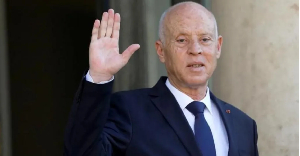Africa deserves a greater say in the UN, Ranking Member of Foreign Affairs Committee of Parliament, Samuel Okudzeto Ablakwa, has said.
The Member of Parliament (MP) for North Tongu is giving a strong backing to on-going clamour for inclusion of an African representative on the UN Security Council.
In a commemorative statement to mark UN Day on Tuesday, October 24 Mr Ablakwa, in supporting the calls by President Akufo Addo, said it was imperative due to the myriad issues affecting Africa which need the intervention of the global body.
Parliamentary correspondent, Ekow Annan, reported that Mr Ablakwa believes it should be sooner than later due to several conflicts on the continent.
It will be recalled that Mr Akufo-Addo made a similar call on Thursday, 21 September when he delivered his maiden speech at the UN General Assembly in New York.
"It has been talked about and scheduled for a long time, but somehow, we have never found the courage and the will to reform the United Nations,” he said.
“Ghana supports the process of UN reform, especially of the UN Security Council, as set out in Africa’s Common Position on UN Reform, based on the Ezulwini Consensus,” he indicated, adding: “The time is long overdue to correct the longstanding injustice that the current structure and composition of the UN Security Council represents for the nations of Africa.”
Under the Charter, the Security Council has primary responsibility for the maintenance of international peace and security. It has 15 Members, five of which are permanent (China, France, Russian Federation, the United Kingdom, and the United States) and 10 others non-permanent derived through a process of rotation.
Each Member has one vote. Under the Charter, all Member States are obligated to comply with Council decisions.
The Security Council takes the lead in determining the existence of a threat to the peace or acts of aggression. It calls upon the parties to a dispute to settle it by peaceful means and recommends methods of adjustment or terms of settlement. In some cases, the Security Council can resort to imposing sanctions or even authorise the use of force to maintain or restore international peace and security.
The Security Council also recommends to the General Assembly, the appointment of the Secretary-General and the admission of new Members to the United Nations. And, together with the General Assembly, it elects the judges of the International Court of Justice.
General News of Tuesday, 24 October 2017
Source: classfmonline.com
Okudzeto backs Akufo-Addo's call for UN reform
 MP for North Tongu, Samuel Okudzeto Ablakwa
MP for North Tongu, Samuel Okudzeto Ablakwa












